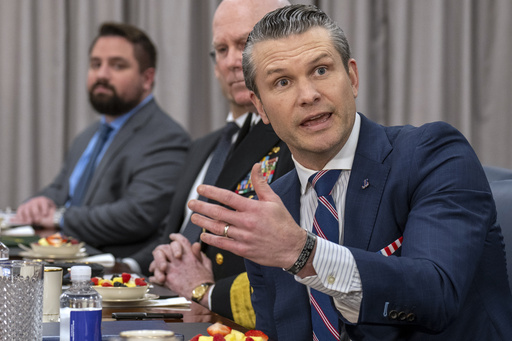In Washington, the defense sector witnessed a significant shakeup as Secretary Pete Hegseth announced the replacement of top military service lawyers. Hegseth expressed that the current legal advisors were not apt enough to provide sound recommendations when lawful orders were in question. During a meeting with Saudi Arabia’s defense minister, Hegseth declined to comment on President Donald Trump’s controversial decision to appoint a retired general as the new Joint Chiefs chairman despite not meeting the legal qualifications for the role.
This decision came on the heels of President Trump’s sudden dismissal of Air Force Gen. CQ Brown Jr., the chairman of the Joint Chiefs. Following this, Hegseth also removed Navy Adm. Lisa Franchetti, who served as the chief of naval operations, and Air Force Gen. James Slife, the vice chief of the Air Force. He also initiated a call for nominations for new judge advocate generals, known as JAGs, for the Army, Navy, and Air Force.
Names of the dismissed lawyers have not been disclosed. However, Vice Adm. Christopher French, the Navy JAG, had retired just two months ago, leading to an ongoing search for his replacement. Meanwhile, Army JAG Lt. Gen. Joseph B. Berger III and Air Force JAG Lt. Gen. Charles Plummer were also removed from their posts. These unexpected changes have caused concern throughout the Pentagon amid unease over ongoing demands from Elon Musk for federal employees to provide recent job achievements by Monday’s end, even though officials later clarified that this mandate was optional.
As this drama unfolded at the Pentagon, military and civilian personnel were left to balance their security duties with apprehension about potential further dismissals. Defending Trump’s decision, Hegseth remarked that past presidents have also restructured military leadership, asserting it is within the president’s rights. However, Trump’s choice of retired Air Force Lt. Gen. Dan Caine as chairman is unconventional, since he does not meet all legal criteria for the position, which traditionally requires experience as a combatant commander or service chief. These qualifications can be waived by the president if necessary.
Historically, Pentagon leaders have rotated top military officials into service chief roles, at least temporarily, to qualify them for the chairman’s position. While the dismissal of senior military personnel is not new, the rationale for such decisions has typically been transparent, often citing disagreements in war strategies or administrative issues. The current situation involving Gen. Brown, notable for his historic role as a Black fighter pilot and the second Black general to hold the chairman position, has drawn scrutiny as he is the first to be relieved of this duty in modern history.
Hegseth, prior to assuming the role of Defense Secretary, had already voiced opposition to Brown’s appointment, questioning if his selection was racially motivated. He emphasized that evaluations should focus on merit, yet the criteria used to assess Franchetti, Slife, and the previously mentioned lawyers remain unclear.
The removals have stirred confusion and speculation within Pentagon ranks, igniting debates on whether political motivations or diversity stances influenced these decisions. Notably, Hegseth has campaigned against leaders promoting diversity and equity in military settings. Echoing Trump’s administration sentiments, there have been hints that military figures advocating so-called “wokeism” or diversity initiatives could face repercussions. Hegseth claims these diversity efforts could potentially compromise military readiness.


